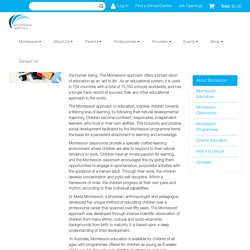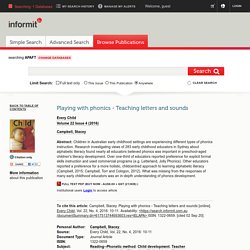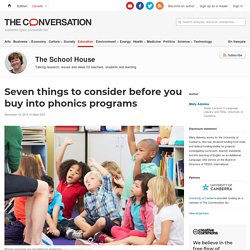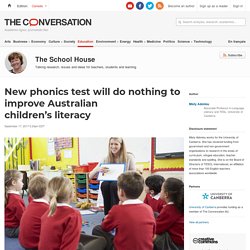

QUTeX - Professional and executive education. Department of Education, Skills and Employment. Exercise - Teaching Phonics in Early Childhood - Queensland University of Technology. Developing early literacy : assessment and teaching / Susan Hill - Details. (2) The Snail and the Whale Julia Donaldson. Beetle soup : Australian stories and poems for children / compiled by Robin Morrow ; illustrated by ... Grandpa And Thomas - Pamela Allen. Department of Education, Skills and Employment. Department of Education, Skills and Employment - Document library, Australian Government. Qklg pd lit phonics. Montessori Australia. Montessori is an approach to supporting the full development of the human being.

The Montessori approach offers a broad vision of education as an ‘aid to life’. As an educational system, it is used in over 22,000 schools worldwide, and has a longer track record of success than any other educational approach in the world. The Montessori approach to education, inspires children towards a lifelong love of learning, by following their natural developmental trajectory. Children become confident, responsible, independent learners, who trust in their own abilities. The inclusivity and positive social development facilitated by the Montessori programme forms the basis for a persistent attachment to learning and knowledge. Montessori classrooms provide a specially crafted learning environment where children are able to respond to their natural tendency to work.
Watch a video: Why choose Montessori education for your child? Every Child - Playing with phonics - Teaching letters and sounds (APAFT) - Informit. Abstract: Children in Australian early childhood settings are experiencing different types of phonics instruction.

Research investigating views of 283 early childhood educators in Sydney about alphabetic literacy found nearly all educators believed phonics was important in preschool-aged children's literacy development. Over one-third of educators reported preference for explicit formal skills instruction and used commercial programs (e.g.
Letterland, Jolly Phonics). Other educators reported a preference for a more holistic, childcentred approach to learning alphabetic literacy (Campbell, 2015; Campbell, Torr and Cologon, 2012). What was missing from the responses of many early childhood educators was an in-depth understanding of phonics development. SAGE Publications Australia. Department of Education, Skills and Employment - Document library, Australian Government. Queensland Curriculum and Assessment Authority. Feeling the pressure: Early childhood educators' reported views about learning and teaching phonics in Australian prior-to-school settings.
Seven things to consider before you buy into phonics programs. Phonics, or teaching reading, writing and spelling through sounds, is often touted as the golden path to reading and writing.

National curricula in England and Australia have been rejigged to increase their focus on phonics, and entrepreneurs and publishers have rushed to fill the space with phonics programs and resources. But before you buy their wares, consider the following. 1. English is not a phonetic language This may be an inconvenient truth for those promoting phonics programs, but English is not a phonetic language and never has been. English began about 1500 years ago as a trio of Germanic dialects brought over to the islands we now know as the British Isles.
The Latin alphabet was a good phonetic match for spoken Latin, but it was not a good match for spoken Old English. There were sounds in Old English that simply didn’t exist in spoken Latin, so there were no Latin letters for them. Those letters were repurposed and some new letters were introduced. 2. 3. 4. 5. 6. 7. Synthetic phonics and the teaching of reading: the debate surrounding England's ‘Rose Report’ New phonics test will do nothing to improve Australian children's literacy. Minister Birmingham released a report today recommending that all Year 1 students in Australia complete a phonics test.

The panel responsible for the report has recommended that Australia adopt the Year 1 phonics screening check that has been used in England since 2011. What is phonics? Phonics is the process of matching sounds to letters. (2) Teachers TV: Phonics. Exercise - Teaching Phonics in Early Childhood - Queensland University of Technology. 2016 December Joint Statement by ALEA and PETAA. Rr22. YouTube. A programme that grows with your children - Jolly Phonics. A programme that grows with your children Our flagship programme, Jolly Phonics, teaches children to read and write using synthetic phonics, which is widely recognised as the most effective way to teach children to read and write in English. That was over 25 years ago. Since then our immense progress has been studied in numerous research projects, the results of which led to phonics becoming central to the UK curriculum. Today we are now used in over 100 countries worldwide.
As the leading synthetic phonics publisher, and the most experienced, we offer a 7-year school programme that teaches not only phonics, but spelling, punctuation and grammar too. Emma Ince is the Deputy Head Teacher at Tudor Primary School in Suffolk, England. Www.letterland.com.au. Learn to Read with Phonics.